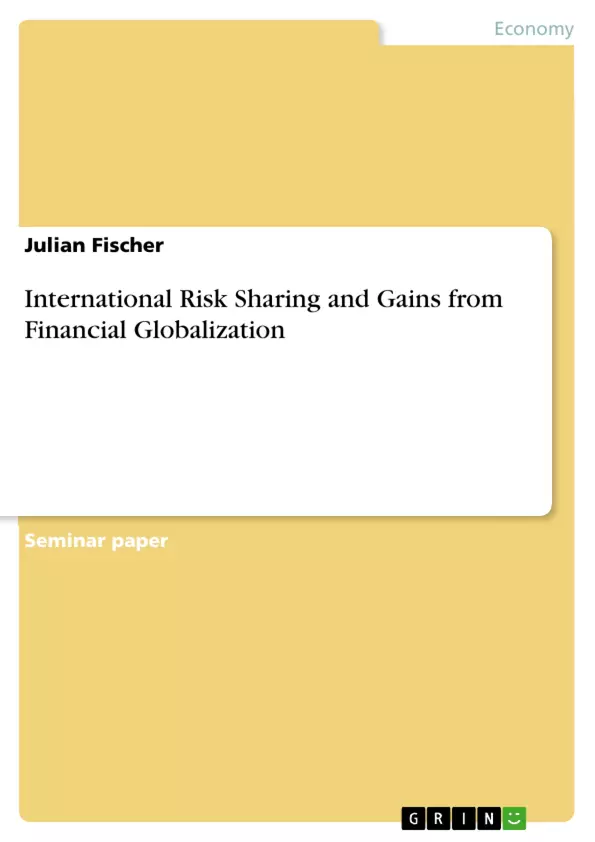In this paper, potential of international risk sharing for emerging markets will be investigated, particularly in terms of financial integration and liberalization. The incentives of financial integration will be surveyed in terms of international risk sharing, indicate benefits for emerging market economies. In addition, it will be investigated if huge foreign capital inflows show positive effects of risk sharing for them.
Several government leaders all over the world recognize the potential of financial globalization for their country. A strong incentive for deeper financial linking can be observed. Three of the development countries in Africa already grew up to the so called emerging markets: Egypt, Morocco and South Africa. To keep up with the fast growing population and facilitating the economic growth, they want to stimulate employments for agriculture and infrastructure by investment partnerships with the G20, whereas Donald Trump, the President of the USA, would like to cut funding World Bank programs like credit guarantees or small business access to finance for these countries. Indeed, these development countries, also including emerging markets, need to implement more structural changes like liberalizing financial markets and financial transparency for these intentions.
Is international risk sharing able to smooth uncertainties in the emerging markets? Will they catch up the distance to industrial countries? In light of ongoing financial integration and economic development, the influence of international risk sharing in terms of financial globalization for emerging markets will be investigated. Just little evidence of risk sharing can be seen throughout the last decades, but still some persuasive inquiries are to be considered. Improvements in international risk sharing potentially lead to stabilizing effects, scarcer sudden stops and smaller risk premiums. Structural policy changes and better financial integration could surmount the threshold effect.
Inhaltsverzeichnis (Table of Contents)
- Introduction
- Fundamental theory and theoretical predictions
- Relevance of risk sharing
- Gains of diversification
- Home Bias Puzzle
- Empirical investigations of risk sharing in emerging markets
- Consumption risk sharing
- Impact of financial integration
- Impact of default risk
- Policy interventions and capital flows
- Risk sharing and defaults in different subgroups
- Relations between idiosyncratic output fluctuations and financial market developments
- Lacks of international risk sharing
- Why is there so little risk sharing in emerging markets?
- Sensitivity of international risk sharing for financial integration under sovereign default risk
- Country heterogeneity in cyclicality patterns
Zielsetzung und Themenschwerpunkte (Objectives and Key Themes)
This paper investigates the influence of international risk sharing in terms of financial globalization for emerging markets. It analyzes the potential of international risk sharing for emerging markets, particularly in terms of financial integration and liberalization. The work explores how improvements in international risk sharing could lead to stabilizing effects, scarcer sudden stops, and smaller risk premiums. It also examines the impact of structural policy changes and better financial integration on the threshold effect of risk sharing.
- The role of international risk sharing in emerging markets
- The impact of financial globalization on risk sharing
- The influence of default risk on international risk sharing
- The effectiveness of policy interventions and capital flows on risk sharing
- Heterogeneity in cyclicality patterns across countries
Zusammenfassung der Kapitel (Chapter Summaries)
The first chapter introduces the topic of international risk sharing and its relevance for emerging markets. Chapter two discusses the fundamental theory and theoretical predictions of international risk sharing, including the gains of diversification and the home bias puzzle. Chapter three delves into empirical investigations of risk sharing in emerging markets, examining consumption risk sharing, the impact of financial integration, the impact of default risk, and the relationship between idiosyncratic output fluctuations and financial market developments. Chapter four investigates the lack of international risk sharing in emerging markets, exploring reasons for this phenomenon, the sensitivity of risk sharing to financial integration under sovereign default risk, and country heterogeneity in cyclicality patterns.
Schlüsselwörter (Keywords)
The main keywords and focus topics of this text include financial globalization, international risk sharing, emerging markets, default risk, financial integration, capital flows, cyclicality patterns, and the home bias puzzle.
Frequently Asked Questions
What is international risk sharing?
International risk sharing is a mechanism where countries diversify their economic risks through global financial integration, helping to smooth consumption during local economic shocks.
How does financial globalization benefit emerging markets?
It can lead to stabilizing effects, smaller risk premiums, and increased investment in infrastructure and agriculture through international partnerships.
What is the "Home Bias Puzzle"?
The Home Bias Puzzle refers to the observation that investors tend to hold a disproportionately large amount of domestic assets despite the potential gains from international diversification.
Why is there so little risk sharing in emerging markets?
Barriers include sovereign default risks, lack of financial transparency, and insufficient structural policy changes in these developing economies.
Can risk sharing help emerging markets catch up with industrial countries?
While potential exists, evidence shows that emerging markets need deeper financial liberalization and structural reforms to overcome the "threshold effect" and fully benefit from risk sharing.
- Arbeit zitieren
- Julian Fischer (Autor:in), 2017, International Risk Sharing and Gains from Financial Globalization, München, GRIN Verlag, https://www.grin.com/document/371885



